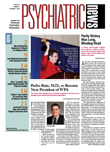As many states consider new cuts to their Medicaid programs to compensate for larger-than-expected drops in revenue, Massachusetts is celebrating the decision of federal officials to grant a Medicaid waiver that would allow broader access to the commonwealth's unique health insurance program.
Massachusetts will be able to expand its first-in-the-nation health care program because federal officials have agreed to provide a $10.6 billion boost over the next three years, according to Massachusetts officials.
“This is an exceptional outcome under any circumstances, especially so now,” said Gov. Deval Patrick (D) at a press conference announcing the Medicaid funding. “The American economy is in turmoil, and the future is uncertain. But even in tough times, we cannot afford to abandon our commitment to affordable, accessible, high-quality health care for every man, woman, and child in the commonwealth. Thanks to this agreement, we can keep our commitments.”
The waiver from Medicaid's standard funding and benefit formula for states followed months of negotiations between Massachusetts and federal officials. It will provide Massachusetts with about $2.1 billion more over the next three years than it received from the federal government three years ago in its last Medicaid waiver package.
The waiver allows Massachusetts to provide subsidized health insurance to some residents with incomes higher than would typically be allowed under traditional Medicaid rules.
The funding boost came as state leaders were scrambling to cover a substantial budget shortfall.
The agreement with the federal government also allows Massachusetts to spend $5 billion over the next three years, or about $1 billion more than previously allowed, on its newly created programs. The amount was $2 billion less than Massachusetts requested last December, but it was described as sufficient because enrollment in the expansive Massachusetts health insurance program has slowed in recent months.
Massachusetts' legislative leaders said the agreement will provide crucial support for the state's historic health care reform law, which was enacted in 2006 and requires nearly every resident to have coverage (Psychiatric News, July 4).
“The waiver enables the state to continue to provide good, affordable health care to families and provides additional funding and flexibility to build on these early successes in the years to come,” said Sen. Edward Kennedy (D-Mass.) in a written statement. “We've made major progress in the program's first two years, cutting the number of uninsured in half, and increasing employer-sponsored coverage.”
The Massachusetts insurance program will inform the national health reform debate in 2009, Kennedy said.
The Massachusetts agreement runs counter to the recent experience of many other state Medicaid programs in which state officials are fighting with federal officials for the right to extend subsidized health insurance to people with incomes higher than is traditionally allowed under Medicaid rules. Massachusetts is one of the few states to offer Medicaid coverage to residents with higher incomes than normally allowed by the federal government.
Massachusetts was granted permission to amend its Medicaid program in 2006 to provide subsidized health insurance to individuals making up to 300 percent of the federal poverty level, or roughly $31,000 for a single person and $63,600 for a family of four in 2008.
That eligibility standard made thousands more residents eligible for health coverage that is at least partially subsidized by the federal government. That provision was renewed under a key part of the recent waiver package.
Over the last two years, the Massachusetts health care insurance law has moved nearly 440,000 more residents into coverage, about half of whom were enrolled in employer-sponsored programs. The larger-than-expected number of residents who are still uninsured, however, led to a $130 million funding gap, which Massachusetts officials are working to close, in part, through increased premiums and copayments for residents who receive subsidized coverage.
The commonwealth has put off a plan to require employers to boost the amount they were paying for their employees' insurance.
More information on the Medicaid package is posted at<www.lawlib.state.ma.us/2006/01/medicaid-bill-will-limit-eligibility.html>.▪
